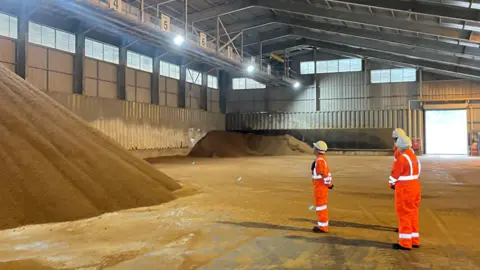**Bioethanol Plant Ceases Production Amid Financial Struggles**
Vivergo, one of the two bioethanol plants operating within the United Kingdom, has officially halted its production line, initiating a shut-down process that will lead to the lay-off of approximately 160 employees starting on Tuesday. This closure marks a significant development in the bioethanol sector, which has been grappling with financial troubles exacerbated by rising competition from imported ethanol from the United States.
Following extended discussions, the UK government decided not to extend financial support to the bioethanol sector, a decision announced last Friday. This choice seems to be rooted in the government’s commitment to fiscal responsibility, concluding that aiding the struggling sector would not provide sufficient value to taxpayers while failing to resolve the industry’s ongoing challenges. Consequently, Vivergo, owned by Associated British Foods, faced a dilemma: continue operating at a substantial financial loss or cease operations entirely. Given these circumstances, the company opted for closure, planning to dismantle the plant by the year’s end.
The implications of Vivergo’s closure extend beyond just the immediate job losses. Bioethanol is an important fuel source, frequently produced from organic materials such as waste oils and grains, playing a crucial role in reducing emission levels when added to fuels like E5 and E10 petrol as well as sustainable aviation fuel. The closure of Vivergo threatens to destabilize a vital segment of this industry, which was already under pressure due to UK trade agreements that favor imported ethanol over domestic production.
In May, the UK government signed a trade deal eliminating existing tariffs on ethanol imports from the US, up to a quota of 1.4 billion liters. This agreement, while being a strategic move to ease trade tensions concerning automobile and steel tariffs, has raised concerns among domestic biofuel producers. The UK bioethanol sector has argued that imported ethanol receives an unfair competitive edge since it is recognized as a waste byproduct in the US, while UK-produced bioethanol does not enjoy similar classification or benefits.
Vivergo’s closure has raised alarms regarding potential secondary impacts on suppliers and associated businesses. As pointed out by Ben Hackett, the managing director of Vivergo, the fallout from these layoffs will ripple through local agriculture, particularly affecting farmers who supply wheat not fit for human consumption. The inability to secure alternative markets for this grain could place further economic pressure on local producers.
Additionally, the other UK bioethanol plant located in Redcar, Teesside, owned by the German company Ensus, remains in a precarious situation. It is currently awaiting news on potential government support aimed at safeguarding carbon dioxide production, which is essential across various industries, including food production and healthcare.
Many industry analysts and stakeholders are particularly concerned about the national implications of this closure. Andrew Symes, CEO of OXCCU—an organization dedicated to producing sustainable aviation fuel—highlighted the risks associated with increased reliance on imports for vital components like ethanol and CO2, stating that such dependency needs to be reconsidered in light of national interests.
In defense of its decision, the government contended that it had acted in the “national interest”, claiming that the tariff agreement with the US would safeguard hundreds of thousands of jobs in sectors like automotive and aerospace. However, critics like Charlotte Brumpton-Childs of the GMB union argue that an effective green energy industrial strategy relies on the resilience and longevity of local bioethanol plants. She emphasized that failing to support such facilities undermines the commitment to green jobs and renewable energy in the UK.
In conclusion, as Vivergo embarks on its closure process, stakeholders across the bioethanol sector are left grappling with the challenges posed by international trade agreements and domestic policy, questioning the future of bioethanol production in the UK amid growing competition from imports.











